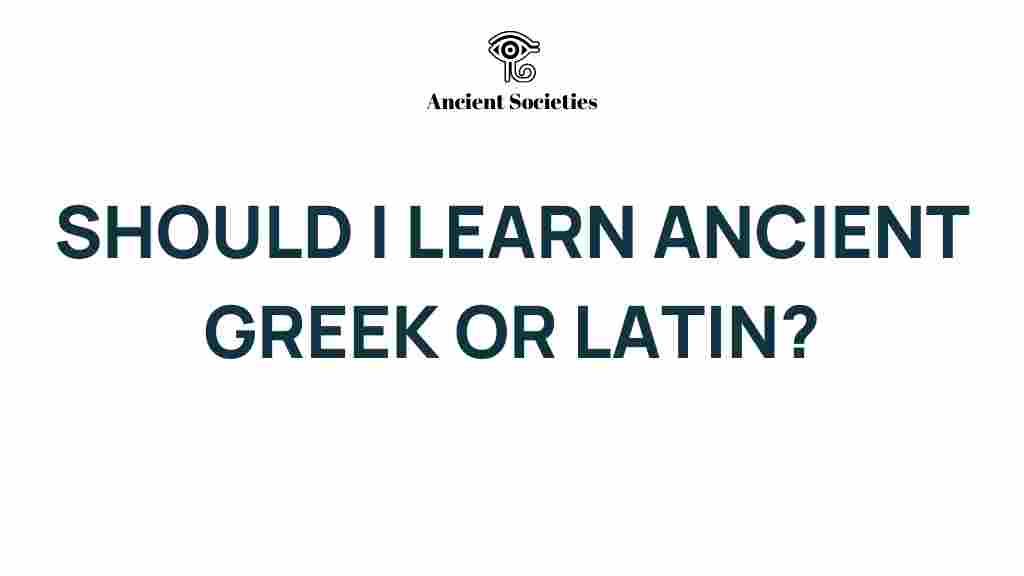Ancient Greek, Latin, and Their Role in Language Learning and Understanding Our Past
When it comes to the foundations of Western civilization, two languages stand out prominently: Ancient Greek and Latin. Both languages have played crucial roles in shaping our history, culture, education, and linguistics. This article will explore the importance of Ancient Greek and Latin in classical studies, their influence on modern languages, and how they can help us understand our heritage. Whether you’re a student, a language enthusiast, or simply curious about the past, this guide will provide insights into which language might hold the key to unlocking the secrets of our history.
The Historical Significance of Ancient Greek and Latin
To appreciate the relevance of Ancient Greek and Latin, we must first delve into their historical contexts.
- Ancient Greek: This language flourished in the Mediterranean region from around the 9th century BC. It was the language of philosophers such as Plato and Aristotle, poets like Homer, and historians like Herodotus. Ancient Greek contributed significantly to the fields of literature, philosophy, and science.
- Latin: Emerging later, Latin became the dominant language of the Roman Empire by the 1st century BC. It was the language of law, governance, and literature. Latin has had a profound impact on the development of the Romance languages and continues to influence modern scientific and legal terminology.
Both languages are not just relics of the past; they are living parts of our educational systems and cultural identities.
Why Study Ancient Greek and Latin?
Learning Ancient Greek and Latin offers numerous benefits, including:
- Understanding Classical Texts: Many foundational texts in Western literature, philosophy, and science were written in these languages. Mastery of Ancient Greek or Latin allows deeper engagement with these works.
- Enhancing Language Skills: Both languages provide insights into the structure and vocabulary of modern languages, particularly English. This can improve overall language learning and comprehension.
- Cultural Literacy: Knowledge of Ancient Greek and Latin enriches one’s understanding of historical and cultural references that permeate literature, art, and even politics.
Furthermore, the study of these languages fosters critical thinking and analytical skills, which are valuable in any educational pursuit.
The Process of Learning Ancient Greek and Latin
Embarking on the journey to learn Ancient Greek or Latin can be both exciting and daunting. Here’s a step-by-step process to guide you through effective language learning.
Step 1: Set Clear Goals
Determine why you want to learn the language. Are you interested in reading classical texts, enhancing your career, or simply exploring your heritage? Setting clear goals will help you stay motivated.
Step 2: Choose the Right Resources
There are various resources available for learning Ancient Greek and Latin:
- Textbooks: Look for reputable textbooks like “Athenaze” for Ancient Greek or “Wheelock’s Latin” for Latin.
- Online Courses: Websites such as Coursera and edX offer courses in these languages.
- Language Apps: Apps like Duolingo and Memrise provide interactive ways to learn vocabulary and grammar.
- Study Groups: Joining or forming a study group can enhance your learning experience through collaboration and discussion.
Step 3: Immerse Yourself in the Language
To truly grasp Ancient Greek or Latin, immersion is key:
- Read Aloud: Practice reading texts aloud to improve pronunciation and fluency.
- Translate Texts: Start with simpler texts and progressively tackle more complex works.
- Use Flashcards: Create flashcards for vocabulary and grammar rules to aid memorization.
Step 4: Engage with the Culture
Understanding the culture behind a language enriches the learning experience:
- Explore Classical Literature: Read works by authors like Homer, Virgil, and Plato in their original languages.
- Attend Lectures and Workshops: Many universities offer lectures and workshops on classical studies.
- Visit Historical Sites: If possible, visit ancient ruins and museums to connect with the physical heritage of the language.
Troubleshooting Common Challenges
Learning Ancient Greek or Latin can present challenges. Here are some common issues and tips for overcoming them:
- Difficulty with Grammar: Both languages have complex grammatical structures. Consider using grammar guides and seeking help from teachers or online forums.
- Limited Vocabulary: It’s normal to forget words. Regular practice and review can help reinforce your vocabulary.
- Finding Time to Study: Integrate language learning into your daily routine. Even short, consistent practice sessions can be effective.
Conclusion: The Key to Our Past
In conclusion, both Ancient Greek and Latin hold significant keys to understanding our past, shaping our cultural heritage, and enriching our educational journeys. Whether you choose to study Ancient Greek, Latin, or both, you will gain invaluable insights into the foundations of Western civilization. The skills and knowledge acquired through language learning extend far beyond the classroom, enhancing your appreciation of history, culture, and linguistics. By committing to this journey, you are not only preserving the legacies of the past but also preparing yourself for a brighter, more informed future.
As you embark on your language learning adventure, remember that each step you take brings you closer to unlocking the rich tapestry of our heritage.
This article is in the category Culture and created by AncientSocieties Team
